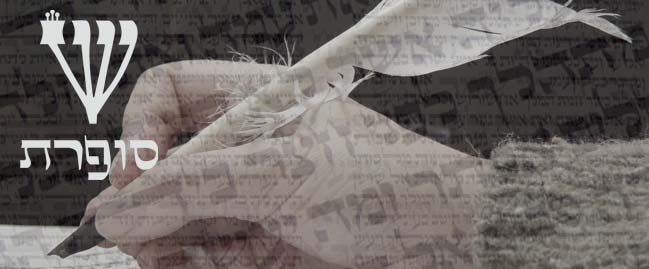SLIP INTO SHABBES
בס"ד
14 Av
This morning I completed the checking I had been asked to do. Barukh HaShem!
Some people wonder why they should have their Sifrei checked. It's because we aren't allowed to to use a Sefer Torah for kri'at HaTorah (public Torah readings) if it has errors*. Some rabbis say we aren't even allowed to learn out of it. People & congregations who wish to be stringent will have their Torahs professionally checked, rather than take the chance that a problem may be discovered during a reading, after you have said the blessing (in vain, turns out) & must stop & switch to another Torah...if you have one available**.
There are, of course, kulas (lenient opinions) which disagree with the above.
I headed into downtown Boston to buy calligraphy felts for the Hebrew calligraphy & midrash class I'm teaching on Sunday & got ready for Shabbes
* Rambam, Hilchot Sefer Torah; Rashba, Teshuvot HaRashba
** Rashba, Teshuvot HaRashba; Rabbeinu Asher, Teshuvot HaRosh; many, many others














5 Comments:
No, the Rosh says that you must stop, put that Torah away and start again at the beginning of the parsha. Rashba says that ideally that's what you'd do but we don't actually make people sit through the whole reading again. Mordechai says you stop as soon as possible, make the bracha ahrona (interesting, no?) and then switch to a new sefer. Shulhan Aruch says you should stop at once, make no bracha ahrona, and continue reading from that point in a new sefer with no bracha rishona. His commentators are mostly weirded out by this. Yeruham isn't happy with the idea of the brachot you already made being levatalah, and so says you can count the reading from the pasul sefer as talmud Torah, thus justifying the brachot you already made. Al regel echad. :)
בס"ד
I understand the above somewhat it differently than you do, based on what my sofer has taught me.
בס"ד
"...the Rosh says that you must stop, put that Torah away and start again at the beginning of the parsha. Rashba says that ideally that's what you'd do but we don't actually make people sit through the whole reading again."
In Teshuvot HaRashba 1:227 & 1:230, the Rashba says that we are not allowed to read from a Sefer Torah that contains any mistakes. He even says that if you find an error during k'riat HaTorah (public Torah reading), then we have to start all over again from the beginning using a kosher Sefer Torah. The Rashba's opinion is supported by Rabbeynu Asher, in Teshuvot HaRosh 3:8
"...Mordechai says you stop as soon as possible, make the bracha ahrona (interesting, no?) and then switch to a new sefer. Shulhan Aruch says you should stop at once, make no bracha ahrona, and continue reading from that point in a new sefer with no bracha rishona."
I agree with your understanding of Mordechai's ruling in Megilah 794, which is supported by the Rama. However, I believe that the Shulchan Aruch is in fact ambiguous on this subject & doesn't really address it (Shach, Yoreh De'ah 279:3; Mishna Berurah 143:13).
All this being said, R' Aharon HaKohen of Lunil includes in his Orchot Chayim, Hilkhot K'riat HaTorah no. 5, a responsum of the rabbis in Narvona who say that the laws of Sefer Torah are so fantastically complex that it is basically impossible to mandate reading from only perfectly kosher Sifrei Torah. So we shouldn't be too anal-retentive about all this. But then I'd be pretty laid back too, if I lived in Provence.
:D
The Shulhan Arukh gives his own psak (from the Ri bei Rav) - he explains it at length in the Beit Yosef to Yoreh Deah 279 - but it's a bit odd, and seems to come out of nowhere, which is why everyone puts so much effort into explaining it. Like Mishnah Berurah 143:13 takes ages explaining everyone's shita and then tries to explain how SA fits in with all that despite apparently being totally different. Rema tries to lessen the weirdness by bringing the Mordechai and suggesting that SA and Mordechai can coexist. Sort of works, except that there's no reason to suppose such a co-existence unless you wanted to force the opinions to harmonise. Oh wait, that's halachic process, isn't it?!
בס"ד
That's one word for it ;+>
R' Joshua Flug calls the Shach ambiguous on this subject. He also writes that the Mishna Berurah 143:29, offers a compromise to the dispute between Magen Avraham and Dagul MeR'vavah based on a comment of the Gemara, Megillah 21b. All in all, there's a reliable p'sak on every imaginable position in this issue, much like most issues in Judaism...so sometimes I wonder why Halakhic debate is used as a tool to divide us Jews rather than unite us...
Post a Comment
<< Home